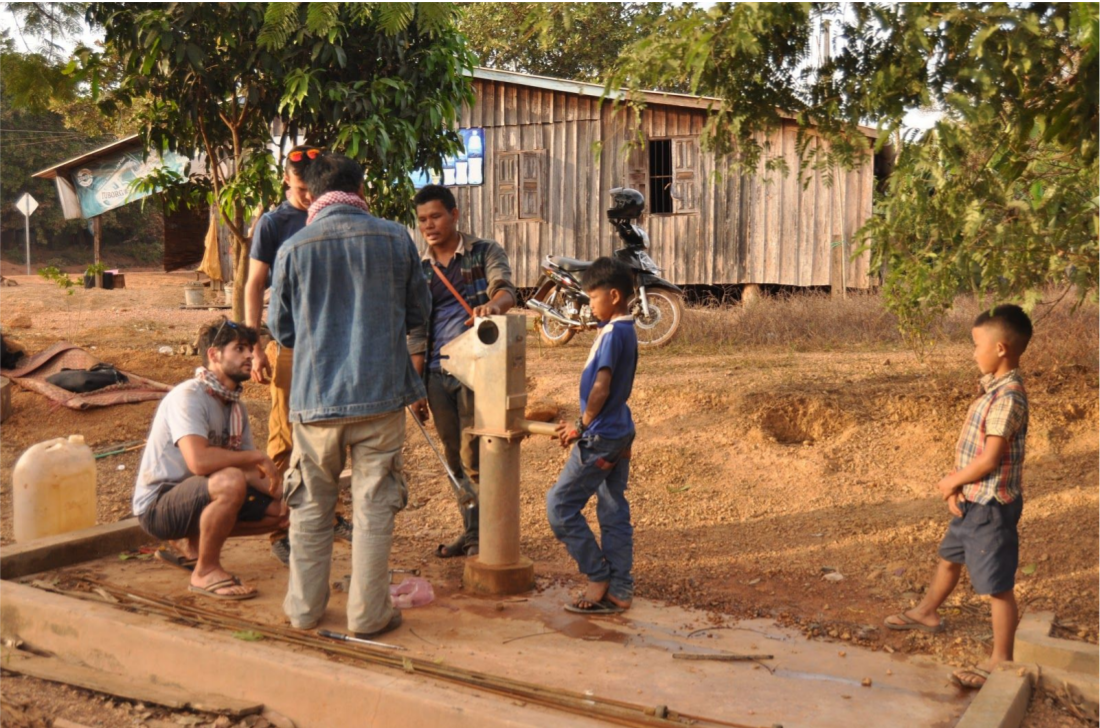Elizabeth Joyce, Engineers Without Borders USA (EWB-USA) staff Project Engineer specializing in energy and climate, reflects on how climate change dramatically affects her work. She also shares how EWB-USA helps build resilient communities — one project at a time.
By Elizabeth Joyce
 Climate change disproportionately affects the world’s poorest and most vulnerable communities. As one writer at the Center for Global Development put it, “Climate change will be awful for the rich, but catastrophic for the poor.”
Climate change disproportionately affects the world’s poorest and most vulnerable communities. As one writer at the Center for Global Development put it, “Climate change will be awful for the rich, but catastrophic for the poor.”
Climate change results in altered rainfall patterns, rising seawater levels, ocean acidification, and warmer or cooler temperatures. All of this hinders people’s access to food, clean water and essential services. It also increases exposure to disease.
Subsistence agriculture, which so many of EWB-USA’s partner communities depend on, faces increasing risks as the changing climate affects growing seasons, water resources and agricultural pests. Climate change will spur more and more humanitarian crises as changes in natural resources inflame armed conflict, and as weather events like droughts and storms force evacuation and displacement.
Seeing the Impacts First-hand
This is not an abstract concept for EWB-USA. I’ve personally seen climate change’s effects on the projects I worked on over the past decade.
My first volunteer project with EWB-USA was in rural Haiti. The community’s remote valley is accessed by a single road that crosses a seasonally flooding river at multiple points. These river crossings have become increasingly dangerous every year, causing regular drownings and vehicle loss, and leading EWB-USA to start a project to build bridges at two crossings.
When I worked with the Engineering Service Corps (ESC) in Ethiopian refugee camps in 2017, Somali refugee herders shared stories about drought impacting their livelihoods. They told me that an estimated 90 percent of the local community’s livestock had died in the past year, causing widespread famine and forcing many to flee Somalia in search of aid.
The Horn of Africa experienced two severe multi-year droughts in the last decade, and refugees said they don’t remember ever having numerous devastating weather events within such a short time.
Responding to a Changing Climate
But it’s not all gloom and doom. We believe that EWB-USA is uniquely positioned to respond to the challenges brought on by climate change. With engineering technology, we can empower our partners to prepare for and adapt to climate change.
This can happen through improved irrigation systems, stronger buildings and infrastructure, water systems with increased capacity for drought, or clean energy systems that sustainably power equipment. By supporting adaptive engineering projects that improve resilience, we can help our partner communities protect themselves in the face of an uncertain future.
Our Climate Work in Action
Many EWB-USA projects are already responding to the challenges of climate change.
- In Dominica, we helped the Dominican Ministry of Housing and the United Nations Development Program (UNDP) assess buildings that were damaged in Hurricane Maria. We also helped develop a country-wide resiliency strategy that prepares infrastructure to better withstand future storms.
- In Cambodia, we worked with the O’rana community to create a water storage plan to address water shortages and lack of water access. The community noticed longer seasons without rain in recent years, and their primary sources of water were drying up.

- In Kenya and India, we helped UNICEF (United Nations Children’s Fund) identify and implement energy upgrades to its field operations, such as energy efficient equipment and solar power. This IKEA Foundation-supported project allowed UNICEF to operate more sustainably and safely.
- In the U.S. Virgin Islands, the island of St. John was stripped of protective vegetation by two Category 5 hurricanes in 2017, causing sinking around the only road between the eastern and western halves of the island. Subsequent storms continued to cause erosion and stormwater pollutant runoff to enter bays from steep hillsides. We helped the island address these issues through hillside stabilization measures and control of stormwater runoff.
In addition to our project support around the world, EWB-USA is looking at our own carbon footprint and examining how to implement our projects in a more efficient way. This includes improved design guidelines and technical resources, measurement of EWB-USA’s carbon footprint, better project monitoring and evaluation indicators, and increased coordination with EWB-USA’s country offices and local partners.
Climate change is arguably the greatest challenge our world faces, and one that directly threatens many of our close friends and partners. The EWB-USA community has the knowledge, skills and motivation to tackle this challenge together and continue to build a more sustainable, resilient and just world.
About the Author
 Engineers Without Borders USA’s Elizabeth Joyce has worked extensively with our Engineering Service Corps specializing in climate change mitigation projects and refugee camp settings.
Engineers Without Borders USA’s Elizabeth Joyce has worked extensively with our Engineering Service Corps specializing in climate change mitigation projects and refugee camp settings.
